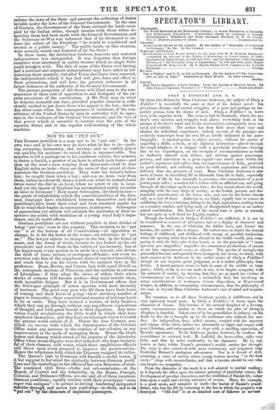NOT TO BE " PUT OUT."
THE German postillion is a man not to be "put out." In his own time and in his own way he does what he has to do—pack- ing, strapping, harnessing, and driving; and no earthly power can quicken his motions—to retard them is inconceivable. Ten minutes to lift a package on to his cumbrous vehicle, five minutes to fasten a buckle, a quarter of an hour to attach each horse—and then on the road a pace varying from three-and-a-half to four English miles an hour—these are the rates of that surest of chro- nometers the German postillion. They were his father's before him : he caught them when a boy ; and can no more vary from them, unless in a fever-fit, than a watch can whirl its minute-hand twice round the dial in an hour' when no screw or pin is loose. And yet the Queen of England has accomplished nearly ten miles an hour in Germany I How many Schwagers, (brothers-in-law— the grade of relationship which the conventionalities of the Ger- man language have established between themselves and their postillions) have burst their wind and been rendered unable for life to wind their bugles in consequence, is unknown. Schwagers of generations yet unborn will astonish the auditories of their re- spective inn-yards with traditions of a young royal lady's impa- tience, and its woful effects. German postillions are not without parallels in their dislike of being "put out," even in this country. This aversion to be " put out " is at the bottom of all Conservatism—all opposition to change, be it for the better or the worse—all reluctance to "get on." The lawyer objects to changes in the law in the forms of court, and the forms of deeds, because he has looked up the old precedents and noted them in the tablets of his memory, has at his finger-ends every motion to be made in a lawsuit, can dictate the draft of lease, release, or mortgage, off-hand ; and every in- novation robs him of the complacent sense of superior knowledge, and sends him to con his lesson with the meanest tyro in the profession. Dean, Rector, and Curate, look with equal ill-will on the retrograde motions of Puseyism and the motions in advance of Liberalism : if they adopt the views of either, their whole stocks of sermons will become useless—they must rewrite them, with incredible fatigue. But it is in Government offices that the Schwager principle of action operates with most intensity of inertness. The good easy men who fill them have their hours of coming and their hours of going—their statutory number of pages to transcribe—their constitutional number of red-tape knots to tie or untie. They have learned a routine of daily business which they can go through without any superfluous expenditure of thought, and with great benefit to their digestion. Any inno- vation would revolutionize the little world in which they have ensphered themselves, and they have no telescopic vision to search the greater world outside of it. Hence the true German pos- tillion vis inertia with which the functionaries of the Colonial Office resist any increase in the number of our colonies, or any improvement in the mode of managing them. Hence the blank horror and dismay which struck all the inmates of the Admiralty Office when steam-frigates were first talked of—the huge buckets- ful of their element, cold water, which these amphibious officials still throw upon every proposal to improve the packet-service. Hence the reluctance with which the Treasury resigned its tallies. The Queen's visit to Germany will furnish a useful lesson, if it but suggest to her mind the similarity between German pose lions and the underlings in the offices of her own Ministers of state. The combined civil force—clerks and sub-secretaries—at the Boards of Control and the Admiralty, in the Home, Foreign, Colonial, and Ordnance Offices, are one and all of them incarnate German postillions; equally resolute with their prototypes " stare super vies antiquas"—to persist in driving lumbering antiquated vehicles through and across ruts yard-deep—in short, not to be ""put out" by the clamours of impatient passengers.


























 Previous page
Previous page